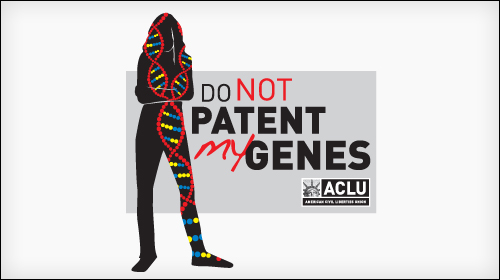
Tuesday is National DNA Day, which commemorates the discovery of DNA’s double helix structure by James Watson and Francis Crick in 1953, as well as the successful completion of the Human Genome Project in 2003. In honor of National DNA Day, the National Human Genome Research Institute will be hosting an online chat from 8 am to 5 pm Eastern today, in which experts will answer questions about DNA in real time.
In 2009, the ACLU and the Public Patent Foundation (PUBPAT) filed a lawsuit charging that patents on two human genes associated with hereditary breast and ovarian cancer (BRCA1 and BRCA2) are unconstitutional and invalid. The lawsuit was filed on behalf of professional medical associations, geneticists, breast cancer and women’s health groups, and patients who have all been negatively impacted by the patents. Two organizations that are participating in the gene patents case are cosponsoring DNA Day: the American College of Medical Genetics, a plaintiff in the case, and the American Society of Human Genetics, which filed a friend-of-the-court brief.
Understanding the structure and function of DNA is undoubtedly one of our most important scientific advances. But contrary to the spirit of free inquiry that led to these discoveries, the government subsequently issued patents on about 20 percent of the human genome, which grants exclusive rights on DNA and can impede scientists and doctors from continuing to learn about those segments of DNA and their implications for human health.
Last month, the U.S. Supreme Court vacated the divided appeals court decision in the case, which had held that companies can obtain patents on the genes but cannot patent methods to compare those gene sequences (a trial court previously invalidated all of the challenged patents as covering products and laws of nature). The Supreme Court instructed the appeals court to reconsider the case in light of Mayo v. Prometheus, a Supreme Court decision issued last month that unanimously invalidated patents on methods for evaluating a patient’s response to a drug, because they essentially claimed the body’s natural reactions.
Now that we’re back to the appeals court, we’ll continue the fight to end gene patenting. The practice of granting private companies control over crucial information about our own bodies is wrong. To commemorate National DNA Day, we’re encouraging you to join our campaign to “Take Back Our Genes.” Through the campaign, people across the country have shared their stories about how gene patenting has affected themselves or a loved one.
Surely Watson, Crick, and the researchers involved in the Human Genome Project didn’t intend for their work to one day enter into private ownership. This information was always meant to be free, and so we encourage you to stand with us, because you’re the only one who can own your genes.
Learn more about gene patents: Sign up for breaking news alerts, follow us on Twitter, and like us on Facebook.



